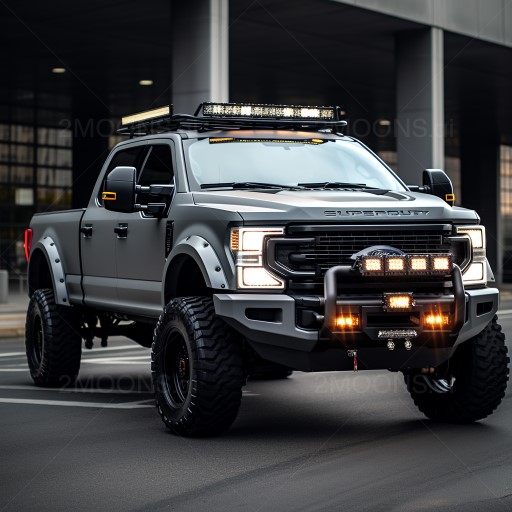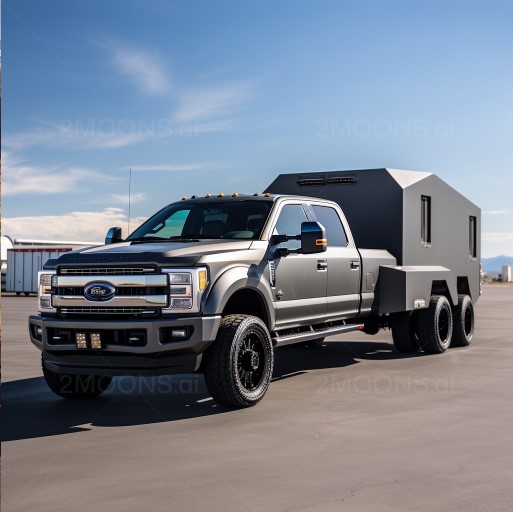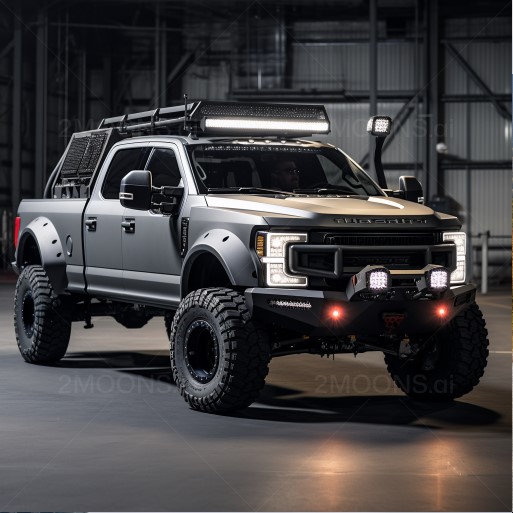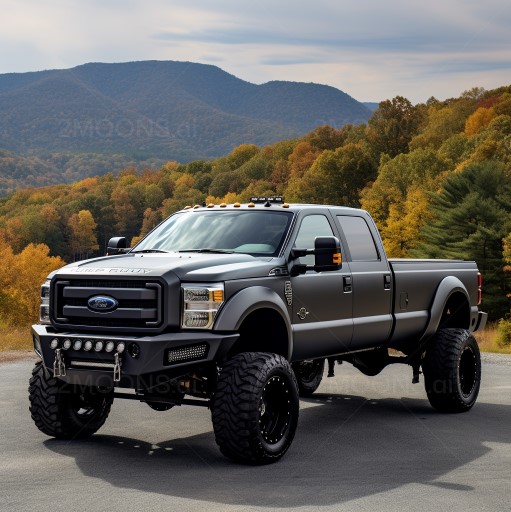Introduction to the Ford F350

Heavy-duty part of your routine? Looking at the The Ford F350?. It’s more than just a pickup; it’s a rolling declaration that you’ve got serious work to do. Whether you’re hauling massive trailers across state lines, tackling construction sites where lesser trucks would tremble, or just want that feeling of unstoppable capability, the Ford F350 answers the call.
But here’s the thing: while the Ford F350 Super Duty earns its legendary status, it’s not the perfect truck for everyone. It’s big, thirsty, and rougher riding than your average daily driver. Before you take the plunge on one of these heavy-duty beasts, there are some things you absolutely need to know.
This blog post is your in-depth guide to the Ford F350. We’ll cover everything from its hauling prowess to what it’s like to live with one of these trucks day-to-day. Consider this your honest look at what makes the Ford F350 special, and how to decide if it’s the right fit for your needs.
Let’s be clear: A Ford F350 might be overkill if you’re occasionally towing a boat on weekends. But if you make your living behind the wheel, demand maximum towing and hauling capability, or simply believe that bigger is always better, then prepare to discover why the Ford F350 has earned its place as a workhorse icon.
The Basics: What is a Ford F350?
When someone says “Ford F350,” they’re not talking about a basic work truck. The Ford F350 belongs to Ford’s Super Duty lineup, a whole different breed of pickup designed to handle the toughest jobs imaginable. Let’s break down what sets it apart:
Bigger (and Stronger) Than a Ford F150:
While it might share styling with the familiar Ford F150, underneath, the Ford F350 boasts a beefier frame, heavy-duty suspension, and often a more powerful drivetrain. This translates into the ability to tow heavier trailers and haul more weight in the bed without breaking a sweat.
Built for Work, Not Just Weekends:
If you buy an F150, there’s a chance it’ll haul the occasional load of mulch but mainly serve as a commuter. The Ford F350 assumes you’re putting it to work regularly – towing, hauling, and generally tackling terrain that would leave lighter-duty trucks stuck.
Cab Styles and Bed Lengths:
Like its smaller F-series siblings, the Ford F350 offers choice to suit different needs.
Cabs: Regular Cab (basic, 2 doors), SuperCab (extended with smaller rear doors), and Crew Cab (spacious, 4 full-size doors)
Beds: Regular bed lengths are around 6.75ft or the longer 8ft option for maximum cargo capacity.
Dually or Not?
Some Ford F350’s have single rear wheels, while others get dual rear wheels (often called a “dually”) for enhanced stability when hauling extreme loads.
Trim Levels:
The Ford F350 ranges from work-focused XL models with vinyl floors to surprisingly luxurious trims like the Platinum edition. This choice impacts how comfortable your work truck will be, and of course, the price tag.
It’s Not One-Size-Fits-All:
The term “Ford F350” covers decades of trucks. While the core mission stays the same, keep in mind there are significant differences between a 1990s Ford F350 and a brand-new one.
Ford F350: Built to Haul and Tow

The Ford F350’s reputation as a hauling and towing beast isn’t hype. It’s earned through serious engineering designed to handle loads that would buckle lesser trucks. Let’s dive into what makes it so capable:
Payload vs. Towing Capacity: Know the Difference
- Payload: This is how much weight you can safely carry IN the truck bed. This matters for loading construction materials, gravel, or basically anything heavy you’re hauling around.
- Towing Capacity: This is how heavy a trailer the truck can pull. Think horse trailers, large boats, heavy equipment on trailers, etc. Most people focus on this number, but payload is crucial too!
How the Ford F350 Gets It Done:
- The Frame: Beefier than a F150, designed to handle the twisting forces of hauling big trailers and the sheer weight of heavy loads without bending over time.
- Suspension: Stiffer springs and heavy-duty shocks let the Ford F350 carry weight more confidently. The tradeoff is a rougher ride when unloaded, especially on older models.
- Axles and Brakes: Upgraded components for serious stopping power and to handle the loads placed on those axles when working at or near the truck’s capacity.
- The Turning Factor: It’s Not Just About Power
- These trucks are LONG and WIDE. Manoeuvrability in tight spaces is a challenge – parking lots, job sites, even your driveway. Plan your turns carefully and expect to sometimes do a three-point (or five-point) turn where smaller vehicles wouldn’t.
The “Overkill” Factor: Be Honest With Yourself
It’s easy to get caught up in those huge tow ratings, but realistically assess how often you’ll actually tow or haul near the F-350’s limits. For occasional use, stepping down to a smaller truck might make daily life a LOT easier.
Ford F350 Power: More Than Just Numbers

Don’t be fooled into thinking choosing a Ford F350 engine is just about who lists higher horsepower numbers. The way these trucks make power (and where in the rev range) is what truly matters for getting the job done.
Engine Options: Understanding the Lineup
The specific engine choices in F-350s vary greatly depending on the model year. Here’s an overview of popular eras to help you understand what you might find on the used market:
Older Ford F350s (Pre-2000s):
- Gas Engines: Ford’s V8s were the workhorses, with the 5.0L, 5.8L, and the mighty but thirsty 7.5L (460) being common. Expect decent power for their time but don’t look for modern efficiency.
- Diesel: The 7.3L Power Stroke made its name here. Known for reliability (if maintained!), these offer strong pulling power by the standards of the era.
2000s-2010s:
- Diesel Domination: Ford’s 6.0L and 6.4L Power Stroke diesels became the go-to for maximum capability. Reliability is spotty, with model year and maintenance history significantly impacting how trouble-free they’ll be.
- Gas Options: V8s continued, with the modular Triton 5.4L being a common sight. These are basic but get the job done for lighter-duty work or if budget is the primary concern. The 6.8L V10 offered serious power but dismal fuel economy.
Modern Era (2011+):
- Diesel Powerhouse: The 6.7L Power Stroke is a beast, delivering massive torque and refinement compared to its predecessors. Reliability has generally been strong for well-maintained examples.
- Gas Evolves: The 6.2L gas engine provides a solid blend of pulling power and improved fuel economy versus the earlier F-350 gas options. The 7.3L V8 introduced in later years is a torque monster for those who don’t want the diesel’s complexity.
Transmission Talk: Gearing Matters
The transmission paired with a Ford F350’s engine impacts real-world performance heavily. Expect to see heavy-duty automatics built to handle the stress of towing. Lower gears mean maximum pulling power off the line, while higher gears let it cruise comfortably (and more efficiently) on the highway.
Decoding a Used Ford F350:
Do Your Homework! Before looking at a specific truck, research the common powertrain options for its year, their reputation, and known trouble spots. That knowledge is your best defense against buying a problem child.
Is the Ford F350 a Good Daily Driver?
Let’s be brutally honest: for most people, the answer is no. An F-350 is a tool built for serious work first. While some folks daily drive them, it’s accepting major compromises in comfort, convenience, and cost compared to driving a smaller truck or car.
Parking & Maneuverability: A True Challenge
- City Streets Are the Enemy: Finding a parking space long enough is a chore, garages are often out of the question due to height, and even narrow suburban streets require extra focus to avoid clipping parked cars with those wide mirrors.
- Tight Turns Forget It: The Ford F350’s turning radius is like a school bus. Expect to avoid drive-thrus with narrow lanes and plan your route carefully through residential areas.
- Backing Up is an Adventure: Add a trailer, and it only gets worse. A backup camera is a must, and even then maneuvering in reverse is slow and stressful.
Fuel Costs: Ouch
Especially with rising gas prices (and diesel being even more expensive), the Ford F350’s thirst hurts. These aren’t designed with fuel economy in mind, particularly older models. Budget for frequent fill-ups, and the pain at the pump is even worse if you don’t truly need its capability.
The Ride Factor: It’s Built for Work, Not Comfort
The Ford F350’s heavy-duty suspension means bumps, potholes, and rough roads transmit directly to your spine, especially while driving around empty. Newer models have improved somewhat, but the tradeoff for their hauling ability is a stiff, jiggly ride unlike what we’re used to in modern cars and crossovers.
The “Worth It” Factor: It Depends on YOUR Needs
- If It Makes You Money: A contractor who lives in their truck all day often accepts these compromises. The Ford F350’s capability is their livelihood.
- Purely for the Image: Some folks buy these trucks just to look tough. More power to them, but it’s an expensive way to get around.
- Occasional Big Hauling: If it’s a few times a year, renting a truck for the day might be cheaper and less stressful than daily driving a Super Duty.
Ford F350 vs. Ford F250: Which Super Duty is Right for You?
They’re both Super Duty titans, but Ford F350 and Ford F250 trucks have key differences. Picking the right one depends on what you REALLY need for hauling and towing.
The Similarities: Let’s Start with What They Share
Before we dive into the nitty-gritty, it’s important to acknowledge what these trucks have in common:
- Shared Platform: Both boast heavy-duty frames, powerful engine options, and heavy-duty suspensions built to conquer tough jobs.
- Cab Styles and Bed Lengths: Both offer regular cab, SuperCab, and Crew Cab configurations with short or long bed options to suit your needs.
- Interior Options: From basic work truck setups to surprisingly luxurious trims, you can find a Ford F250 or Ford F350 that prioritizes creature comforts if desired.
Numbers Game: Breaking Down Capacity Differences
Here’s where the key distinctions lie – raw capability. It’s important to note that these numbers can vary based on model year, specific engine and trim configuration, so always check the door jamb sticker on a used truck for its exact ratings.
- Payload: The Ford F350 typically offers a higher payload capacity, sometimes by a significant margin. Think heavy construction materials, multiple passengers with gear, or a hefty snow plow in the winter.
- Towing Capacity: The Ford F350 generally boasts a higher towing capacity, allowing you to haul massive trailers or equipment that would max out a Ford F250.
The “But Here’s the Catch”
The Ford F350 might seem like the automatic winner, but there are factors to consider beyond the raw numbers:
- Cost: Ford F350’s tend to be more expensive to purchase and maintain than F-250s.
- Fuel Efficiency: Ford F350’s, especially diesels, will generally have worse fuel economy than Ford F250’s.
- Drivability: The Ford F350’s increased payload capacity often comes with a stiffer suspension, translating to a rougher ride when unloaded, especially on older models.
So, When Does an Ford F250 Make More Sense?
Here are some real-world scenarios where the Ford F250 might be the smarter choice:
- Occasional Hauling: If you tow a boat a few times a year or haul moderate loads, the Ford F250’s capabilities are likely more than enough.
- Budget Conscious: Ford F250s offer significant savings on purchase price, fuel costs, and maintenance compared to an Ford F350.
- Daily Driver: The Ford F250, while still not ideal, is easier to maneuver and live with daily compared to the Ford F350’s bulk.
The Ford F350 Reigns Supreme When…
- Towing is Your Business: If you tow heavy trailers regularly, the F-350’s additional capacity is crucial.
- Maximum Payload Matters: Hauling heavy construction materials or equipment where every pound counts? The Ford F350 gives you more headroom.
- Off-Roading with a Trailer: Headed out on rugged terrain with a heavy trailer? The Ford F350’s extra capability can provide peace of mind.
The Verdict: It’s About Your Needs
There’s no single answer to which truck is “better.” It depends heavily on how you plan to use it. By understanding the core differences in payload, towing capacity, and the real-world impact on things like ride quality and fuel costs, you can make an informed decision.
Test Drive Both!
The best way to know which truck feels right for you is to get behind the wheel. Schedule test drives for both the Ford F250 and Ford F350 so you can experience the differences in handling, power, and ride quality firsthand.
Finding, Buying, and Owning a Used Ford F350
Turning the dream of owning an Ford F350 into reality requires extra diligence compared to shopping for a regular used car. These trucks hold their value well, and their heavy-duty lives mean there are pitfalls for the unsuspecting buyer.
Where to Look: Your Search Sources Matter
- Classifieds (the usual suspects): You’ll find Ford F350s on Craigslist, Facebook Marketplace, etc. Expect a mixed bag of well-maintained and seriously neglected trucks – patience is key.
- Specialty Forums: Join forums focused on Ford trucks or your chosen model year. Enthusiasts often sell their trucks directly to other enthusiasts, and these trucks tend to be cared for properly.
- Work Truck Sources: Commercial auctions, government surplus sites, and occasionally even rental lot liquidation sales can turn up retired fleet work trucks. Inspect these very carefully, as they’ve likely been worked VERY hard.
- Dealerships: Some dealers specialize in used trucks or have a heavy-duty section. Expect to pay more, but you might get a limited warranty for peace of mind.
Inspecting for Abuse: What to Scrutinize
These trucks are designed to be tough, but a hard life takes a toll. Pay extra attention to:
- Frame Condition: Rust isn’t just cosmetic on these trucks – it compromises structural integrity. Check for repaired cracks, excessive flaking, and rust holes, especially on the underside.
- Signs of Heavy Towing: Look at the hitch for warping or damage, inspect the wiring for broken connectors, and if possible, ask for maintenance records to see if the transmission was ever serviced.
- Suspension Wear: Leaking shocks, sagging springs, and cracked bushings are common on high-mileage Ford F350’s. Repairs get pricey.
- Tire Condition: Uneven tire wear can indicate suspension trouble, alignment issues, or worn ball joints.
Diesel Considerations: Know What to Look For
Used diesel Ford F350s require extra scrutiny:
- Maintenance Records: Diesels NEED regular maintenance. Demand proof of oil changes, filter replacements, etc. A well-cared-for diesel can last a long time, but a neglected one is an expensive nightmare waiting to happen.
- The Cold Start Test: Before the seller warms up the engine, have them start it cold. Excessive smoke, rough running, or hard starting indicates potential problems.
- Look for Modifications: Aftermarket performance mods can cause engine trouble if done incorrectly. Stock trucks are often safer unless you REALLY know what you’re buying.
Rust Check: The Same, But Worse
Inspect those same areas we covered for the F-150, then add these common F-350 trouble spots:
- Bed Floor: Heavy loads and trapped moisture cause rust-through from underneath. Check around areas where a bed liner might hide damage.
- Cab Mounts: These trucks are heavy! Inspect where the cab mounts to the frame for rust and crushing, especially on former plow trucks.
Maintenance Costs: Brace Yourself
A used Ford F350, especially with a diesel engine, will cost more to upkeep than a smaller truck or a car. Factor these realities into your budget:
- Tires & Brakes: The sheer size of components means replacements cost more.
- Fluids: These trucks hold more oil, coolant, and basically every fluid than a regular vehicle. Expect higher costs for regular maintenance.
- Parts Availability: While core mechanical parts are usually easy to find, body panels, interior pieces, etc., get harder to source as the truck ages.
The Verdict: Should YOU Buy a Ford F350?

We’ve covered a LOT about the Ford F-350. Now it’s time for some soul searching. This truck isn’t for everyone, but for the right owner, it could be the perfect machine for work, play, and tackling anything life throws at you.
Ideal Ford F350 Owner Profiles:
- The Serious Hauler: You tow a big fifth-wheel camper, a horse trailer loaded with multiple horses, or equipment trailers on a regular basis. The F-350’s extra capacity provides peace of mind that you’re not pushing the limits of a lighter-duty truck.
- The Workhorse Trucker: Your truck is your office and your income. You need absolute reliability and maximum capability to get the job done without worry. The F-350 is built to endure the rigors of commercial use.
- Off-Road Adventurer: You build your own roads, hauling heavy trailers deep into the wilderness for epic adventures. The F-350 gives you the confidence to tackle terrain others wouldn’t dare.
- The “Just Because I Want It” Buyer: Hey, there’s something to be said for owning the baddest truck on the block! If you can afford the F-350 lifestyle, and that feeling of capability is worth it, then go for it!
Times to Think Twice:
- Primarily a City Dweller: Those tight streets, cramped parking, and shocking fuel bills will make owning the Ford F350 an exercise in frustration rather than fun.
- Budget Limited: A well-maintained Ford F350 commands a premium price. If money is tight, a smaller truck in better condition might be wiser in the long run.
- Occasional Towing/Hauling: Renting a truck for those few times a year you need major capability might be WAY cheaper than owning an Ford F350 all year long.
The Pride Factor: Let’s Be Honest
Part of the Ford F350’s appeal is the image it projects. There’s a sense of pride in owning such a capable machine, knowing you can handle anything that comes your way, on and off the road. It’s more than just a truck to some folks, and that sense of satisfaction is part of the ownership experience.
Bottom Line: If reading about the Ford F350 brought a grin to your face, the compromises are worth it to you, and you have the budget to handle one, get ready to join the Super Duty club. Just be prepared to answer a lot of questions at the gas station!